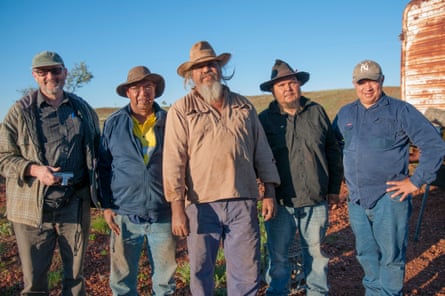Last Sunday evening, 1.3 million Australians tuned in to watch three couples go to war in The Block: there were rooms to renovate, backs to stab and bathroom tiles to barter for. Just as that program finished, another went to air on NITV exploring – from a certain, more meaningful point-of-view – property in Australia.
No photogenic well-to-dos squabbling over acrylic bathtubs; this one followed some of our First Australians fighting to save land that housed their ancestors. And of course it was not merely about property, but of sacred places that remain of extraordinary cultural significance.
This was Connection to Country, the third instalment in NITV’s outstanding four-part documentary series You Are Here (available to watch on SBS On Demand). When I asked SBS how the series was performing ratings-wise, the network declined to answer, on the grounds that on-demand figures were still being counted – though they acknowledged the ratings “are lower than we had hoped”.
It is, of course, no surprise that many more people tuned in to watch boofheads with hammers. But why? You Are Here is a hugely important series – the most vital and pressing suite of locally-made TV documentaries, in fact, since the first season of ABC TV’s Changing Minds, which focused on the under-explored subject of 21st century psychiatric treatment.
But it would be wrong to suggest these films cannot be wolfed down as weekend style, non-intellectually fatiguing viewing. The film-makers have very deliberately made them highly entertaining and unpretentious works.
Three out of four are strongly focused around the personalities of their presenters – who are also the film-makers – including the debut episode, Warwick Thornton’s We Don’t Need a Map, which explored the question of whether the Southern Cross has become a symbol of racism (spoiler alert: it has).

The exception is the second, In My Own Words, which treads a more traditional approach. Film-maker Erica Glynn follows Aboriginal students who attend a classroom in the rural New South Wales town of Brewarrina, learning to read and write for the first time.
In Connection to Country, director Tyson Mowarin charts the battle of the Indigenous people of the Pilbara region to preserve the aforementioned ancient cultural heritage from being destroyed by the mining industry – and complicit governments – including beautiful rock art tens of thousands of years old. Some of the once-great works have been turned to rubble, with plants built above them.
Mowarin visits a heritage-listed sewerage air vent (you read that right) in East Perth, which happens to be situated outside the Department of Indigenous Affairs. The two case studies provide a devastating juxtaposition. The same government that oversees the destruction of some of the world’s oldest art, situated on sacred Aboriginal grounds, protects a defunct sewerage vent built a century ago by settlers. “It must have been important sewerage,” Mowarin muses.
The series concludes this weekend (though hopefully it will have a long shelf life online) with Occupation Native. Film-maker Trisha Morton-Thomas, a wonderfully erratic, waggish and naturally charming on-screen presence, crystallises You Are Here’s raison d’etre. It is about rewriting the narrative.
That narrative in question is the widely accepted, Judeo-Christian-centric view of Indigenous Australian culture and history, which has long suffused school curriculums and informed social attitudes. An important feeling solicited through historical inquiry, as this piece on The Conversation ruminates, is that of empathy, and “engagement for other people from different time periods and cultures.”
But if the very foundation of the history is wrong, as Morton-Thomas asserts, there is limited value in that inquiry – it may even be blatantly dangerous – given it is based on falsity. Her perspective is that there have been well over two centuries of misinformation, and this is her setting the record straight. Rewriting the narrative.

With acknowledgement that history is malleable (the film opens with a George Orwell quote: “The most effective way to destroy people is to deny and obliterate their own understanding of their history”) comes the hope it can be rewritten to right some wrongs. One of Morton-Thomas’ remits is to debunk the widely accepted, racist and incorrect belief that the first Australians were primitive and unevolved people before boatloads of sophisticated white folk arrived to create a superior society.
She unpacks a range of case studies, including how Indigenous Australians were the first people in the world to make bread, and had very well-advanced societies. There were large well-designed houses, dams erected across the country and villages of a thousand people.
If Occupation Native sounds like a dry history lesson, it’s not. Morton-Thomas injects much levity and playfulness, at times deploying the inimitable Steven Oliver to bounce off in comedy sketches. I think of Oliver in the same way I think of The Katering Show’s Kate McCartney and Kate McLennan, in the sense that a few years ago I hadn’t heard of him – and now I refuse to imagine an Australian comedy scene without him.
You Are Here arrives at an exciting time for Indigenous Australian film and television, with several other productions doing narrative rewriting of their own. Cleverman is rewriting the rules on superheroes, for instance, bringing ancient ideas to contemporary tropes. The outrageously good Black Comedy (featuring Oliver in the famous “What’s this then, slut?” routine) is rewriting the previously timeworn, hackneyed genre of sketch comedy.
Meanwhile, what it means to be an Indigenous Australian in the modern world has emerged as a key theme in our contemporary national cinema. The subject has been unpacked in fiction such as Spear, Samson & Delilah, Goldstone and Charlie’s Country, and in documentaries including Zach’s Ceremony, Another Country and Putuparri and The Rainmakers.
All are very much worthy of your time. Some, like the You Are Here documentaries, are exceptional.

